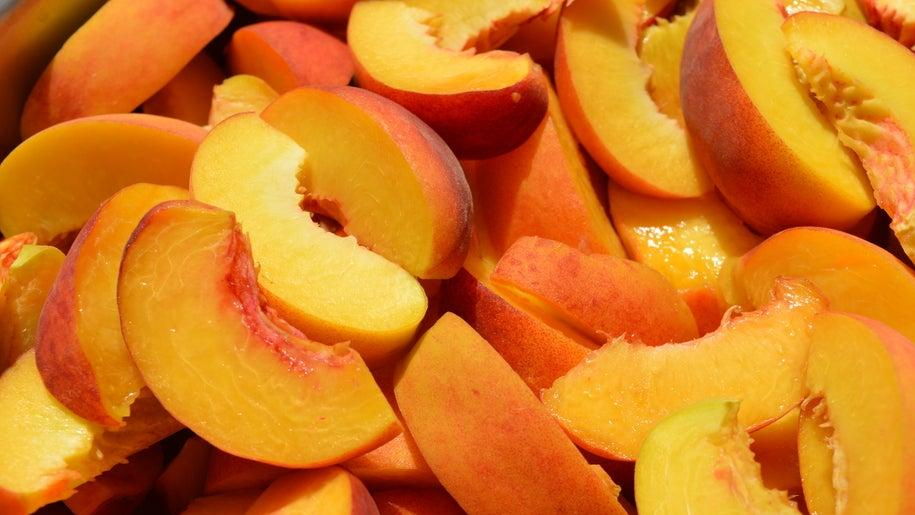Peaches Are Facing A Crisis
Bad news for farmers market devotees: Mother Nature has wreaked havoc on this year's crop.
Peaches and the South have a long and luxurious relationship. Summer brings dreams of peach preserves, peach pie, and peach shortcake. The Peach Truck, founded 12 years ago, has capitalized on that allure.
Last year, it brought Southern peaches, primarily from Georgia, to more than 900 locations around the country, transported on six semi-tractor trailers. Customers who can't pick up their peach boxes in person can sign up to have boxes delivered, and the company also offers subscriptions that ensure fresh peaches throughout the summer.
But this year, the Peach Truck and its network of Southern growers are facing a crisis. In a series of emails to customers, owners Jessica and Stephen Rose warned that there will be vastly fewer peaches this year—perhaps a 60% smaller crop—because of Mother Nature.
"This is an evolving situation, but we wanted to tell y'all what we know here in the moment," they wrote.
Blame the weather
Stephen Rose explained to The Takeout that peach growers have been afflicted by two sets of weather events. First, this past winter was warmer than usual, disrupting the dormancy period when peach trees regenerate. By February, peach expert Dario Chavez at the University of Georgia estimated that the state's peach crop had received 100 t0 140 fewer chill hours compared with last season. Things actually were fine until January, "but then suddenly, our chill was gone" when temperatures warmed up, Chavez wrote on his peach blog.
Then, as trees began to blossom, peach growers in Georgia were suddenly hit by two late frosts in March. The ice crystals picked off a sizable portion of those blooms, meaning fewer could develop into fruit.
"It's not great," Rose said candidly of the supply situation. "The crop will be a whole lot less than we're used to, easily 50 to 60 percent."
Lee Dickey, the owner of Dickey Farms in Musella, Georgia, says the unpredictability means peach growers are constantly on their toes.
"There are so many variables with peaches," says Dickey, whose family has been in the peach business for 125 years. "Like my grandfather used to say, there are no two years ever alike."
Georgia has about 1.6 million peach trees that produce 30 million pounds of fruit each year. Although peaches are grown in many other regions, such as the Great Lakes and on the east and west coasts, Rose says his Peach Truck customers want Southern peaches.
"Could we go to California or New Jersey? Sure. But we want to bring (our customers) the highest quality peaches we can," meaning Southern peaches, he says.
The dwindling peach crop has been a problem for several years. Nationally, the 2022 crop was 15% lower than the 2021 crop, even though farms were coming out of the pandemic, according to the U.S. Department of Agriculture. Only two states, Colorado and Michigan, saw an increase in their harvests last year. The lower yields mean that peach exports, which have been a lucrative market for growers, also have slowed, according to the USDA.
Prepare to pay more
What will all this mean for consumers? For one thing, higher prices. In 2022, the Peach Truck charged $54.95 on Goldbelly for a 25-lb. box, which held about 50 to 70 peaches (or $89.95 for two boxes). Rose hasn't announced prices or sizes for 2023 yet, but he anticipates that growers will be charging a higher price per pound.
Dickey also says it's too soon to estimate prices, but estimates peaches will cost between 20-50% more this year. His company wholesales between seven and eight million pounds of peaches per year, and it negotiates different rates depending on the size of the order and the way groceries and farm markets want them packaged.
Those customers are getting different varieties of peaches than were purchased by past generations, Dickey says. Weather is one factor, but consumers' tastes have changed, too. Some old-fashioned varieties, like the Red Haven peaches that were developed in Michigan in 1940, have been eclipsed by new types, such as the July Prince, which since being introduced in Georgia in 2008 has become his most popular peach.
Peach growers are diversifying
To thwart the price hikes, the Peach Truck plans to offer smaller boxes, something that Rose says they've been thinking about doing for years. They've expanded their product line, adding apples last fall, selling citrus over the winter, and offering Georgia pecans.
For more than 100 years, the Echols family has grown peaches at Jaemor Farms in north Georgia, where it operates two farm markets in Alto and Commerce. While it produces 33 varieties of peaches on 150 acres, the family began diversifying its offerings 20 years ago. It now offers strawberries, blackberries, grapes, cucumbers, and local honey, as well as operating a corn maze.
Dickey's farm also touts strawberries, which customers take home in flats along with ice cream. While his business offers pages of specialty food products on its website, he says there isn't much else he and other peach farmers can do as far as 2023 is concerned.
"What's done is done for this year," he says.
